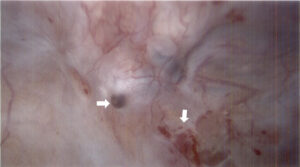
For patients with endometriosis, fibroids and uterine anomalies, finding the right care can be difficult. In some cases, physicians discount or misdiagnose their concerns and symptoms. In other cases, patients have a hard time finding the right provider — someone who will look beyond an individual symptom and also take their wishes and goals into account when designing a treatment plan.
At Brigham and Women’s Hospital, patients no longer have to search in vain to find the right provider for their needs. That’s because the Brigham has recently established two collaborative gynecologic care centers that provide a holistic approach to patient health, eliminating the silos under which traditional gynecologic providers practice.
The new Center for Endometriosis, led by Raymond M. Anchan, MD, PhD, and Louise P. King MD, JD, focuses primarily on evaluation and management of endometriosis. The new Center for Fibroids and Uterine Anomalies, led by Mobolaji O. Ajao, MD, MPH, and Antonio R. Gargiulo, MD, focuses on evaluation of fibroid tumors and the full spectrum of available treatment modalities.
Providers in the two centers are world-renowned in their respective fields and work closely together to provide easy access to streamlined care.
A Multidisciplinary Approach to Treatment
According to Dr. Anchan, endometriosis can be a particularly frustrating condition. Often patients see multiple providers over several years before they are accurately diagnosed. Once diagnosed, patients may be directed to treatments that target their infertility but not their pelvic pain, or vice-versa. Depending on how siloed the provider is, other symptoms — gastrointestinal, gastro-urinary and pain during intercourse — may be ignored completely.
“It is common for patients with endometriosis to not be taken seriously or have their symptoms dismissed,” Dr. Anchan said. “Or they may find a surgeon to perform a removal or ablation of their endometriosis and even a hysterectomy. But more often than not, the patient’s other associated symptoms, including GI or urologic concerns, are not addressed and they are not offered long-term management options.”
The new Center for Endometriosis aims to break down these barriers to holistic care and obstacles to long-term management by focusing on all of the patient’s symptoms as well as their desires. In addition to having their endometriosis addressed — most commonly with surgery and hormonal treatments — patients expressing fertility concerns receive fertility care.
Patients with pain issues receive a referral to a pain clinic or pelvic floor physical therapists who specialize in women’s pelvic pain to address episodic flareups. Those with GI symptoms are referred to a gastroenterologist for evaluation. Those with bladder symptoms or bowel obstruction are referred to urologists, urogynecologists or colorectal surgeons. In rare instances where the endometriosis extends to the surface of the diaphragm, thoracic surgeons are brought in.
As with endometriosis, one size does not fit all when managing fibroids. Some patients are most concerned about the heavy bleeding commonly associated with the condition. Other patients are struggling with fertility issues and want the treatments they receive to preserve their uterus, while others are past their childbearing years but don’t want their uterus surgically removed for personal, cultural or religious reasons.
Dr. Ajao echoed Dr. Anchan’s theme of the importance of listening to each patient’s concerns and said that the type of care delivered should not be based on the specialty of the provider they find.
“With the Center for Fibroids and Uterine Anomalies, each provider on the team brings their unique perspectives and skill sets to the management of fibroids but in a united fashion from a clinical perspective,” he said. “And although our various specialists are world-renowned experts, none of us are doing our job if we don’t align on the patient’s goals.”
Holistic, Collaborative Care for Endometriosis and Fibroids
According to Dr. Ajao, support from the new centers comes from the highest levels at the Brigham and all providers involved must “buy into the shared patient-centric mission.”
Alignment with the centers’ mission also extends to researchers and providers not directly involved in patient care. For example, images from gynecologic radiology are crucial to identifying which surgical specialty the patient should be referred to and whether the patient needs to be counseled about potential postsurgical fertility impacts. The Brigham’s gynecologic pathology specialists expertly analyze fibroid specimens to determine their exact place on the spectrum from benign to cancerous, further helping providers provide the best counsel to patients.
Dr. Anchan said he hopes to add psychiatry and social work specialties to the centers in the near future. “Because gynecologic conditions like endometriosis and fibroids can affect patients’ most intimate relationships, we need to address those issues as well,” he said. “Our ability to provide total holistic care is one of the reasons patients come to the Brigham from across Boston, the Northeast and the entire country to a place where they’ll really be heard.”